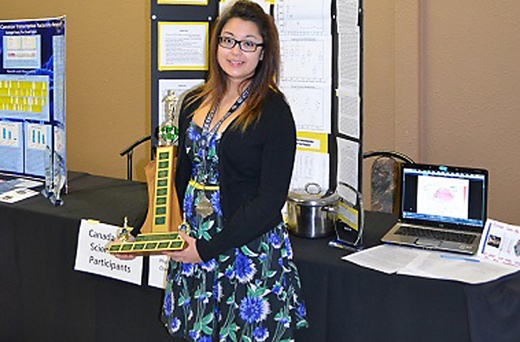SUBHEAD: High-school student’s science project finds high radiation levels in grocery-store seafood.
By Robson Fletcher on 25 March 2014 for Metro news -
(http://metronews.ca/news/calgary/982233/alberta-students-science-project-finds-high-radiation-levels-in-grocery-store-seafood)

Image above: Grande Prairie high-school student Bronwyn Delacruz with her award-winning science project, titled, ‘Is Radioactive Contamination Reaching Store Bought Edible Seaweed?’ From original article.
[IB Publisher's note: If governments, universities and individual scientists won't do it the kids will have to themselves.]
Alberta high-school student Bronwyn Delacruz loves sushi, but became concerned last summer after learning how little food inspection actually takes place on some of its key ingredients.
The Grade 10 student from Grande Prairie said she was shocked to discover that, in the wake of the 2011 Fukushima nuclear disaster in Japan, the Canadian Food Inspection Agency (CFIA) stopped testing imported foods for radiation in 2012.
So, she decided to carry out her own tests.
Armed with a $600 Geiger counter bought by her dad, Delacruz studied a variety of seafoods – particularly seaweeds – as part of an award-winning science project that she will take to a national fair next month
.
“Some of the kelp that I found was higher than what the International Atomic Energy Agency sets as radioactive contamination, which is 1,450 counts over a 10-minute period,” she said. “Some of my samples came up as 1,700 or 1,800.”
Delacruz said the samples that “lit up” the most were products from China that she bought in local grocery stores.
Her results caught the attention of judges at the Peace River Regional Science Fair, who moved her project along to the Canada-Wide Science Fair in Windsor, Ont., in May.
Delacruz also hopes to catch the attention of lawmakers in Ottawa with a petition urging the federal government to do more radiation testing on food.
The CFIA states online that it “continues to monitor events in Japan” but has no immediate plans to resume regular radiation testing, noting “Japanese controls on the sale of contaminated product remain intact.”
The agency did extensive testing on a variety of foods for a year and a half after the nuclear disaster in Japan but found no cause for concern at that time.
“More than 200 food samples were tested and all were found to be below Health Canada’s actionable levels for radioactivity,” the CFIA states in a February 2014 posting on its website. “As such, enhanced import controls have been lifted and no additional testing is planned.”
See also:
Scientists not panicking after Fukushima radiation found in B.C. soil
.
By Robson Fletcher on 25 March 2014 for Metro news -
(http://metronews.ca/news/calgary/982233/alberta-students-science-project-finds-high-radiation-levels-in-grocery-store-seafood)

Image above: Grande Prairie high-school student Bronwyn Delacruz with her award-winning science project, titled, ‘Is Radioactive Contamination Reaching Store Bought Edible Seaweed?’ From original article.
[IB Publisher's note: If governments, universities and individual scientists won't do it the kids will have to themselves.]
Alberta high-school student Bronwyn Delacruz loves sushi, but became concerned last summer after learning how little food inspection actually takes place on some of its key ingredients.
The Grade 10 student from Grande Prairie said she was shocked to discover that, in the wake of the 2011 Fukushima nuclear disaster in Japan, the Canadian Food Inspection Agency (CFIA) stopped testing imported foods for radiation in 2012.
So, she decided to carry out her own tests.
Armed with a $600 Geiger counter bought by her dad, Delacruz studied a variety of seafoods – particularly seaweeds – as part of an award-winning science project that she will take to a national fair next month
.
“Some of the kelp that I found was higher than what the International Atomic Energy Agency sets as radioactive contamination, which is 1,450 counts over a 10-minute period,” she said. “Some of my samples came up as 1,700 or 1,800.”
Delacruz said the samples that “lit up” the most were products from China that she bought in local grocery stores.
Her results caught the attention of judges at the Peace River Regional Science Fair, who moved her project along to the Canada-Wide Science Fair in Windsor, Ont., in May.
Delacruz also hopes to catch the attention of lawmakers in Ottawa with a petition urging the federal government to do more radiation testing on food.
The CFIA states online that it “continues to monitor events in Japan” but has no immediate plans to resume regular radiation testing, noting “Japanese controls on the sale of contaminated product remain intact.”
The agency did extensive testing on a variety of foods for a year and a half after the nuclear disaster in Japan but found no cause for concern at that time.
“More than 200 food samples were tested and all were found to be below Health Canada’s actionable levels for radioactivity,” the CFIA states in a February 2014 posting on its website. “As such, enhanced import controls have been lifted and no additional testing is planned.”
See also:
Scientists not panicking after Fukushima radiation found in B.C. soil
.
No comments :
Post a Comment